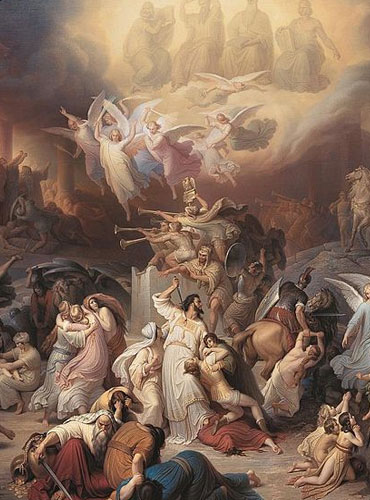Saint Cecilia (Readings from Tuesday of the Thirty-fourth Week in Ordinary Time) – Nov 22nd 2022, Lk 21:5-11
Today’s Gospel offers us an opportunity to mediate on how “the present form of this world is passing away” (1 Cor 7:31). Jesus’ prophesy concerning the destruction of the temple reminds us that the things of this world, and especially the physical ones, will all pass away. Likewise, Christ’s words regarding the escalating tribulations prepare us for the difficulties that are to come.
In the Gospel, Christ gives us three pieces of advice or commands concerning these end times: He tells His listeners, first, “See that you not be deceived,” second, “Do not follow them [meaning, the false messiahs],” and third, “Do not be terrified.”
Regarding the first two, Christ says “See that you not be deceived,” and “do not follow them,” that is, the false messiahs. More literally, for the first He says, “Take heed,” or watch out, “lest you be led astray.” That word for deceived or astray, πλανάω (planaó), means to wander or to get off-course. In the Bible, it almost always implies sinful wandering after false promises and empty goods.[1] The danger, then, is to seek salvation in someone or something other than the real Jesus Christ. As Peter tells the Sanhedrin, “There is no salvation through anyone else, nor is there any other name under heaven given to the human race by which we are to be saved” (Acts 4:12). Only the real Jesus Christ saves; people can look for salvation in material things, or accomplishments, or whatever, but salvation only comes from God. In our lives, we need to really examine ourselves to see what it is we put in place of God, where we seek our happiness and our salvation. It might even be in a false understanding of God. As C. S. Lewis wrote, “I need Christ [Himself], not something that resembles Him.”[2] For this reason, as Saint Peter writes in his second letter, we must “make every effort to supplement [our] faith with virtue, and virtue with discernment” (2 Pt 1:5). Virtue and discernment keep us from being led astray.
Regarding the last, “do not be terrified,” even as Christ anticipates “awesome sights,” which in Greek is fo,bhtra, (phobetra), which more literally means “something that causes terror,” He also encourages us not to be afraid or alarmed. He says, “When you hear of wars and insurrections, do not be terrified.” It’s interesting to note that the Greek word that Christ uses for terrified is ptoéō: it comes from the root meaning, “to fly,” and literally “means to be provoked by agitating fears, causing someone to become ‘psychologically detached from reality.’” We can think of how Saint Ignatius describes the way the evil spirit works: he says “it is characteristic of the evil spirit to harass with anxiety, to afflict with sadness, to raise obstacles backed by fallacious reasonings that disturb the soul. Thus he seeks to prevent the soul from advancing.” We can see how being terrified plays right into the devil’s hands, and make his work easy.
Notice, too, that Christ’s admonition isn’t about the things in themselves, but simply about the hearing of them, meaning, the news of them. How many of us freak out simply about the news of things or even simply the possibility of bad things happening? The only way this is possible is to by keeping our sight focused on God and the Kingdom that is to come.
As we approach the Advent season, we can ask ourselves if we’re following any false messiahs. Have we given ourselves over to Christ, or do we chase after something else? Do we allow ourselves to get worked up over small things, or do we really trust that Christ is Lord yesterday, today, and forever? Let us pray, through the intercession of Mary, Mother of the Church, and Saint Cecilia, for the grace to truly trust that our heavenly Father loves us, and watches over our fight on this earth.
[1] Cf. HELPS Word-studies: 4105 planáō.
[2] C. S. Lewis, A Grief Observed (New York: Harper-Collins, 2009), 65.






